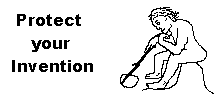
Patent law is constantly changing, due to both legislative and
judicial inputs. This page is devoted (as time allows) to
providing review and analysis of such changes.
Quick-jump site map...
 e-mail us... e-mail us...
Inventor Services, LLC
3601 East Hermes Drive
Salt Lake City, Utah 84124
Voice (801) 274-8851
(877) 780-7040
FAX (801) 272-1127
|
Strategy in view of recent events and important
changes in patent law
OBVIOUSNESS
United States patent law requires that allowable claims must
define a device or method that is novel, and non-obvious.
The Supreme court has recently unfettered the hands of
Examiners at the USPTO to make sweeping accusations that an
inventor's invention is "obvious". The decision in KSR
will have ramifications for many years, and make it more
difficult for an inventor to obtain cost-effective and
meaningful patent protection. In certain circumstances,
inventors may benefit from filing a PPA and aggressively
marketing their invention in hope that a copier will appear
before the subsequently-filed utility application is rejected
in a Final rejection. In such case, evidence of the
copier may be submitted to the USPTO Examiner as a secondary
consideration to refute a rejection under grounds of
"obviousness".
FALSE MARKING
Patent protection requires providing Notice to competitors that
a product or method is patented. That is, damages are
generally calculated from the time a copier first receives
proper Notice that a product or method is protected by one or
more patent. Typically, Notice is made by including the
applicable Patent No (or Nos.), on either the sales and/or
marketing information or on the actual device. However,
the decision in [cite] has imposed an "up to $500.00"
damages fee for each instance (or sale), of a device
that includes even one incorrect patent number. Imagine
how much money is on the table for a product that has sold
millons of units, and the product packaging includes one or
more expired patent numbers, or the number of even one patent
that does not actually "read on" the item being marketed.
A cottage industry has immediately sprung up, in which
attorneys are suing companies for "False Marking". Be
careful, and have your patent counsel review your marketing
materials.
|
Inventor
Services' Home | Patents | Invention Disclosure | Non-Disclosure Agreements | Fees | FAQ | Privacy Policy | SITE
MAP | Feedback for
Webmaster
|

 e-mail us...
e-mail us...